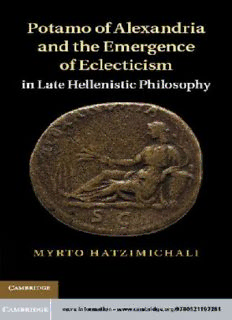Table Of ContentPOTAMO OF ALEXANDRIA AND
THE EMERGENCE OF ECLECTICISM IN
LATE HELLENISTIC PHILOSOPHY
Eclecticism is a concept widely used in the history of ancient
philosophytodescribetheintellectualstanceofdiversethinkers
suchasPlutarch,CiceroandSeneca.Inthisbookthehistorical
andinterpretativeproblemsassociatedwitheclecticismarefor
the first time approached from the point of view of the only
self-described eclectic philosopher from Antiquity, Potamo of
Alexandria.Theevidenceisexaminedindetailwithreference
to thephilosophical and wider intellectual background of the
period.Potamo’sviewsareplacedinthecontextofkeydebatesat
theforefrontoflateHellenisticphilosophicalactivitytowhich
hecontributed,suchasthecriterionoftruth,thefirstprinciples
in physics, the moral end and the interpretation of Aristotle’s
esotericworks.Theemergenceofeclecticismisthustreatedin
connectionwiththemajorshiftinphilosophicalinterestsand
methodsthatmarkedthepassagefromHellenistictoImperial
philosophy.
myrto hatzimichali is Leventis Lecturer in the Impact of
GreekCultureintheDepartmentofClassicsandAncientHis-
toryattheUniversityofExeter.Herresearchinterestscentreon
intellectualandculturalhistory,includingancientphilosophy,
and specifically on how literary and philosophical texts were
transmitted, received and professionally studied in the Hel-
lenisticandearlyImperialperiods.Shehascontributedpapers
tovolumesonHellenisticpoetry,thehistoryofencyclopaedism
andthephilosopherAntiochusofAscalon.
POTAMO OF ALEXANDRIA
AND THE EMERGENCE OF
ECLECTICISM IN LATE
HELLENISTIC PHILOSOPHY
MYRTO HATZIMICHALI
cambridge university press
Cambridge,NewYork,Melbourne,Madrid,CapeTown,
Singapore,Sa˜oPaulo,Delhi,Tokyo,MexicoCity
CambridgeUniversityPress
TheEdinburghBuilding,Cambridgecb28ru,UK
PublishedintheUnitedStatesofAmericabyCambridgeUniversityPress,NewYork
www.cambridge.org
Informationonthistitle:www.cambridge.org/9780521197281
(cid:2)C MyrtoHatzimichali2011
Thispublicationisincopyright.Subjecttostatutoryexception
andtotheprovisionsofrelevantcollectivelicensingagreements,
noreproductionofanypartmaytakeplacewithoutthewritten
permissionofCambridgeUniversityPress.
Firstpublished2011
PrintedintheUnitedKingdomattheUniversityPress,Cambridge
AcataloguerecordforthispublicationisavailablefromtheBritishLibrary
LibraryofCongressCataloguinginPublicationdata
Hatzimichali,Myrto,1976–
PotamoofAlexandriaandtheemergenceofeclecticisminlateHellenistic
philosophy/MyrtoHatzimichali.
p. cm.
Includesbibliographicalreferencesandindex.
isbn978-0-521-19728-1(hardback)
1.Eclecticism–History. 2.Potamo,ofAlexandria. I.Title.
b271.h38 2011
186(cid:3).3–dc22 2011009499
isbn978-0-521-19728-1Hardback
CambridgeUniversityPresshasnoresponsibilityforthepersistenceor
accuracyofURLsforexternalorthird-partyinternetwebsitesreferredto
inthispublication,anddoesnotguaranteethatanycontentonsuch
websitesis,orwillremain,accurateorappropriate.
Contents
Acknowledgements pagevi
Listofabbreviations viii
Introduction 1
1 Eclecticisminmodernand
ancientthought 9
2 EclecticismandAlexandriainthe
firstcenturybc 25
3 PotamoofAlexandria,lifeand
work 67
4 TheeclecticsystemofPotamo’s
ElementaryTeaching 81
82
i Epistemology(Logic)
103
ii Physics
124
iii Ethics
5 PotamoandAristotle’sOnthe
Heavens 140
6 FurtherreferencestoPotamo 163
7 Conclusions 169
Bibliography 184
Generalindex 192
Indexofpassagescited 196
v
Acknowledgements
This book is one of the outcomes of the collaborative research
project on ‘Greco-Roman philosophy in the first century bc’ that
ranattheFacultyofClassics,Cambridgefrom2005to2009,funded
by the AHRC. I am grateful to the entire project team, composed
by David Sedley, Malcolm Schofield, Roberto Polito and Georgia
Tsouni for their encouragement and support. I am also indebted
to the philosophy caucus of the Cambridge Classics Faculty as a
whole, as well as its numerous distinguished visitors. In the course
of those four years I learnt a lot from them, and I always had pre-
cious and stimulating guidance as a relative newcomer to the dis-
cipline of ancient philosophy. I would also like to thank the Mis-
tress,FellowsandStaffatGirtonCollege,Cambridge,forproviding
an ideal collegial working environment while this book was being
written.
While I remain solely responsible for any errors and omissions
in what follows, I could not have done it on my own. Malcolm
Schofield read the first draft of the entire book and made several
very constructive observations. Bob Lloyd, through repeated corre-
spondence, patiently offered substantial help with the geometrical
problems discussed in Chapter 5. The two anonymous referees of
Cambridge University Press also provided very helpful and con-
structive comments, both for the overall orientation of the book
and on points of detail. Last but not least, I wish to acknowledge
the invaluable help and support I had from David Sedley, who
readeverychapteratvariousstages,heldnumerousdiscussionswith
me on all the relevant topics, and made important suggestions and
corrections.
vi
Acknowledgements vii
Finally,IwouldliketodedicatethisbooktothememoriesofAnna
Ju and Bob Sharples, two people who had embraced and supported
the first-century bc project with their participation and advice, and
whoselosswasalltoountimely.
Abbreviations
Abbreviationsofancientauthorsandworksgenerallyfollowthecon-
ventionsofH.G.Liddell,R.ScottandH.S.Jones,AGreek–English
LexiconforGreekandtheOxfordLatinDictionaryforLatin;forfull
titlesofworkswhicharenotinLSJandtheOLDseetheIndexofpas-
sages cited. Abbreviations of journals are as in L’Ann´ee Philologique.
CMG CorpusMedicorumGraecorum.LeipzigandBerlin
1907–.
CPF F.Adornoetal.(eds.),Corpusdeipapirifilosoficigrecie
latini.Florence1992–2008.
DG H.Diels,DoxographiGraeci.Berlin1879.
DK H.Diels,rev.W.Kranz,DieFragmenteder
Vorsokratiker.Berlin1903–52.
DNP H.CancikandH.Schneider(eds.),DerNeuePauly:
Enzyclopa¨diederAntike.Stuttgart1996–2002.
DPhA R.Gouletetal.,Dictionnairedesphilosophesantiques.
Paris1989–.
FGrHist F.Jacobyetal.,DieFragmentedergriechischen
Historiker.BerlinandLeiden1923–58;Leiden1994–.
IEph DieInschriftenvonEphesos.Bonn1979–84.
IG InscriptionesGraecae.Berlin1882–.
LSJ H.G.Liddell,R.ScottandH.S.Jones,A
Greek–EnglishLexicon,9thednOxford1996.
OGIS OrientisGraeciInscriptionesSelectae.Leipzig1903–5.
OLD P.G.W.Glare(ed.),OxfordLatinDictionary.Oxford
1968–82.
viii
Listofabbreviations ix
RE G.Wissowa,W.Krolletal.(eds.),Paulys
Realencyclopa¨diederClassischenAltertumswissenschaft.
Stuttgart1894–1980.
SB F.Preisigkeetal.(eds.),Sammelbuchgriechischer
UrkundenausA¨gypten.Strassburg1915–.
SGLG K.Alpers,H.ErbseandA.Kleinlogel(eds.),
SammlunggriechischerundlateinischerGrammatiker.
Berlin1974–.
SH H.Lloyd-JonesandP.Parsons(eds.),Supplementum
Hellenisticum.Berlin1983.
SVF J.vonArnim(ed.),StoicorumVeterumFragmenta.
Leipzig1903–1905.
TLG ThesaurusLinguaeGraecae.
W C.Wachsmuth,IoannisStobaeiAnthologiilibriduo
priores.Berlin1884.
Description:Eclecticism is a concept widely used in the history of ancient philosophy to describe the intellectual stance of diverse thinkers such as Plutarch, Cicero and Seneca. In this book the historical and interpretative problems associated with eclecticism are for the first time approached from the point

